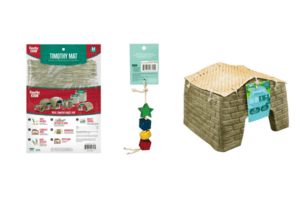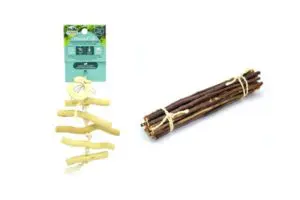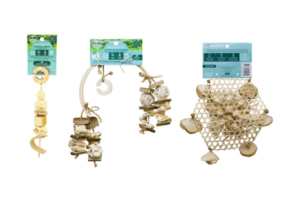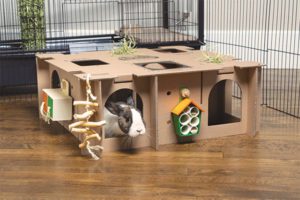By: Dianne Cook, LVT
Rabbits love to chew…on just about anything. Any bunny mom or dad who has ever walked in the room to discover a corner of the carpet, a beloved piece of baseboard, or overlooked electronics cord mysteriously missing a chunk or two knows all too well the passion with which rabbits chew. And, while it is undeniably frustrating to find bunny bites taken out of your valuable belongings, it’s important to remember that a rabbit’s dental indiscretions (and general desire to chew) is instinctually hard-wired in their brains.
If you find yourself frustrated by the chewing habits of a beloved, yet sometimes destructive bun bun, don’t fret; there are a wide variety of safe materials that are both appropriate and enriching for rabbits to sink their teeth into. In this article, we will take a closer look at the best chewing materials for rabbits.
Rabbit-Safe Chewing Materials Include:
- Grass Hay
- Certain Types of Untreated Wood
- Dried Apple Sticks
- Cardboard
- Bamboo
- Willow and Other Woody Plants
- Corn Leaf, Seagrass, Catbriar, Bulrush, Raffia, and Others
For Oxbow’s top safe-to-chew bunny toys, check out our list of top 10 toys for rabbits!
Notes on Rabbit Chewing Safety:
- With the exception of grass hay, the other materials on this list should not be actively consumed in any noticeable quantities by rabbits. Ingesting wood, cardboard, and other materials can lead to gastrointestinal blockage or other serious health issues.
- Most rabbits will consciously avoid ingesting the chewing materials referenced in this article, but it’s important to always monitor the materials you offer your bunny and how they interact with them.
- If you notice your rabbit ingesting any of these materials, remove them from the habitat and consult your veterinarian.
Grass Hay
While it might seem obvious, grass hay is the ideal and most important chewing material for rabbits. In addition to being an essential nutritional staple for all bunnies, the fibrous texture of hay provides essential wear and tear for rabbits’ ever-growing teeth, as well as important mental stimulation.
If your rabbit engages in destructive chewing behaviors, one contributing factor could be an insufficient supply of hay. Remember that fresh, non-soiled hay should be available in unlimited quantities at all times!
In addition to loose hay, woven hay accessories like mats, danglies, and huts can make chewing even more interesting and engaging.

Certain Types of Untreated Wood
Clean, untreated wood makes a fantastic chewing material for rabbits. The coarse texture of wood makes it a fairly durable choice that will last longer than other options on the list. Plus, wood is a natural choice for rabbits who would regularly chew on branches and bark in the wild.
Which Types of Wood Are Toxic to Rabbits?
When it comes to our furry domesticated friends, it’s important to choose wood types and wood-based toys carefully. Not all wood species are safe for rabbits. Some species to avoid altogether due to toxicity include trees that produce fruit with a solid pit (i.e., stone fruit). The branches of stone fruit trees (as well as other parts of the tree) contain cyanide and are therefore toxic to rabbits and other animals.
Species to avoid include:
- Apricot
- Plum
- Peach
- Cherry
- Citrus (Lemon, Orange, and Lime)
Other potentially toxic woods to avoid include:
- Cedar
- Avocado
- Yew
- Balsam Fir
- Cypress
- Juniper
- Spruce
- Other Fresh Pine Species (Untreated Kiln Dried Pine is Safe)
- Holly
- Black Locust
- Hemlock
- Horse Chestnut
- Oleander
- Elder
Safety Note:
While it may be tempting to collect sticks or branches from your backyard or property for your bunny, these materials could have harmful bacteria or fungus growing on them and are best to be avoided for this reason.
Dried Apple Sticks
Natural apple sticks are a fan favorite of bunnies everywhere. Often sold in bundles, apple sticks are simply small pieces of dried branches from apple trees. Apple stick bundles are particularly versatile and popular; bundles can be easily disassembled and offered as single sticks or scattered throughout the habitat to encourage foraging. Other dried fruit tree woods like mulberry make great chews for rabbits as well. Two great fruit wood options include our Apple Stick Bundle and Hanging Mulberry Chew.

Cardboard
Cardboard is a readily available material that rabbits love to chew. Before offering cardboard, just make sure it’s unprinted (no ink) with no labels, tape, or stickers.
Larger cardboard boxes can be offered as a hideout throughout your bunny’s living space. In addition to the comfort of hiding away inside the dark, comfy confines of the box fort, your rabbit will take great pleasure in destroying their cardboard dwelling from within. Replace and repeat.
Clean toilet paper or paper towel roles offer unlimited potential when it comes to supporting your rabbit’s chewing instincts in fun and creative ways. For additional cardboard-based inspiration, check out our DIY Agility Jumps tutorial.
If you’re looking to up your cardboard game, our Customizable Play Place offers hours of entertainment to your rabbit and is designed to be customized with a variety of dangly chews, engagement items, and more.
Bamboo
Bamboo is lightweight, coarse, and, best of all, renewable. For all of these reasons, bamboo makes a great chew material for rabbits. Some of our favorite chew toys (like the Color and Natural Kabobs, Natural Activity Mobile, and Honeycomb Hide & Play) feature bamboo and a variety of other bunny-safe materials.

Safety Note:
Only offer dried (never fresh) bamboo that is sourced from reputable pet channels/brands. The reason for this is that some bamboo-like plants that are toxic to rabbits, including Nandina Domestica or Sacred/Heavenly Bamboo. Lucky Bamboo (which is actually a species of Dracaena) is also toxic and should be avoided.
Willow and Other Woody Vine Type Plants
Willow and other similar woody vine materials can be woven into fun and engaging ball toys for rabbits. These dried materials are coarse, yet pliable enough to be hand woven into fun shapes that rabbits enjoy tossing and rolling when interacting with them.
Check out willow play cubes, vine balls, and vine rings for examples and inspiration of what can be done with these flexible, chewtastic materials.
Other Safe Chew Materials for Rabbits Include:
- Corn Leaf
- Seagreass
- Catbriar
- Bulrush
- Raffia
- Others
Frequently chewing on safe, appropriate materials is a healthy, instinctual activity for all rabbits. As a pet parent, it is important to support this behavior by providing your little loved one a variety of beneficial chewing materials daily. Every time you watch your bunny sink their teeth into apple sticks, cardboard, willow, or a variety of the other materials we’ve covered in this article, you can feel good knowing that you’re providing essential enrichment for your furry friend.

